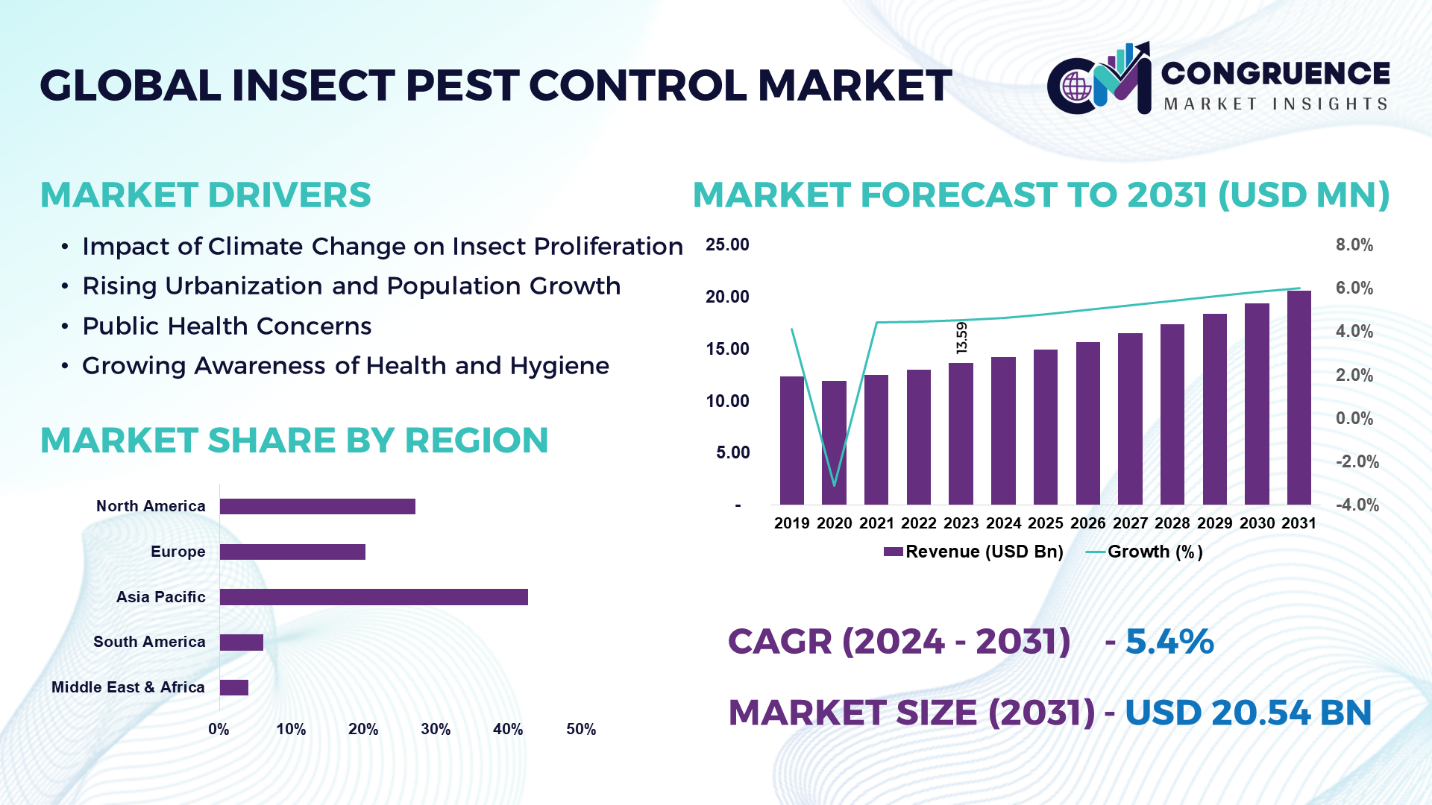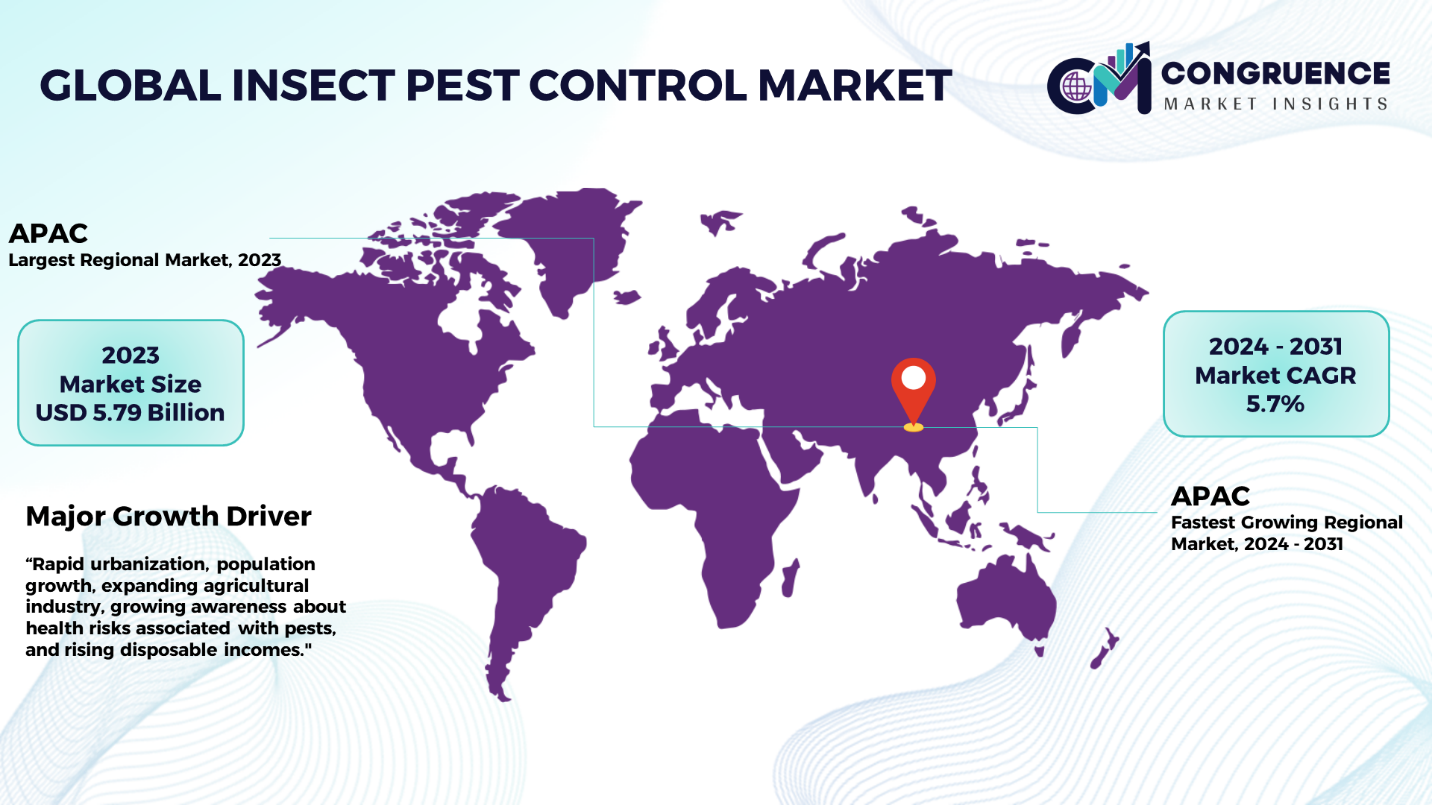Reports
The Global Insect Pest Control Market was valued at USD 13.59 Billion in 2023 and is anticipated to reach a value of USD 20.54 Billion by 2031 expanding at a CAGR of 5.4% between 2024 and 2031.
Insect pest control is the process of managing and controlling insect that cause threats to human health, agriculture, and the environment. This process provides protection from harmful insects that can cause public health issues and damages to property through the usage of various methods. This method is used to protect trees, wood, and crop production as well as humans from insect infestation. Pest control is the management of specific species of insects that are recognized as harmful to human health. Pest control products comes in various forms such as Powder, Liquid, Gels, Sprays,Baits, and Others. Insect pest control products are utilized in a wide range of applications, including commercial and non-commercial institutions, residential buildings, livestock, and industrial sector. The market is influenced by factors such as impact of climate change on insect proliferation, rising urbanization and population growth, public health concerns, and growing awareness of health and hygiene.

To learn more about this report, request a free sample copy
Insect Pest Control Market Major Driving Forces
Impact of Climate Change on Insect Proliferation: Changing climate patterns have led to increase in the population of flying insects. Climate change is leading to warmer temperatures and shifting weather conditions, which create more favorable environments for pests to thrive.
Rising Urbanization and Population Growth: The rapid urbanization and population growth have led to increase in demand for insect pest control services, particularly in denser living conditions. Urban expansion and growing population lead to increased pest infestations, the demand for effective pest control solutions.
Public Health Concerns: Insect pests can transmit diseases such as malaria, dengue, and Zika, which is boosting demand for pest control services. Governments across the globe are taking significant emphasis on public health, which include pest management to mitigate disease transmission.
Growing Awareness of Health and Hygiene: There is an increasing concern towards health and hygiene, which increases the need for pest control services. The growing awareness among individuals and businesses about the health risks associated with pests is driving the demand for pest control services.
Insect Pest Control Market Key Opportunities
Advancements in Pest Control Technologies: Advancements in pest control technologies is anticipated to offer significant opportunities to enhance the effectiveness and efficiency of pest control services. The development of innovative by integrating advanced technologies such as digital monitoring, remote sensors, and smart pest control solutions can improve efficiency and service delivery.
Sustainable Initiatives: Consumers are becoming more environmentally conscious and demanding for sustainable and green solutions. Consumer preferences for safer and more sustainable products create an opportunity to develop eco-friendly pest control solutions. Major companies can capitalize on this trend by offering eco-friendly and more sustainable solutions.
Adoption of IoT and AI-based Technologies: The integration of artificial intelligence and IoT in insect pest control can enhance the effectiveness and efficiency of pest control. The adoption of various advanced technologies, such as AI is on the rise due to the low service cost and its operation in remote locations without interrupting the operation of the facility.
Insect Pest Control Market Key Trends
· Growing environmental awareness is driving the demand for organic, non-toxic, and biodegradable pest control products
· Increasing usage of liquid formulations for instance emulsifiable concentrate, ready to use invert emulsion, and low concentration solutions
· The rising demand to increase the production of agricultural crops along with improving their yields is driving the growth of the market
· The continuous advancements in both ingredient and product levels has led to an enhanced effectiveness and efficiency of pest control
· The growing proliferation of machine learning-based technologies in pest regulators is also influencing to industry development
· Increased use of AI and IoT in insect pest control has enhanced monitoring, detection, and control efficiency
· A growing preference for professional pest control services, driven by the need for effective, reliable, and safe pest management solutions
Region-wise Market Insights
Asia Pacific accounted for the largest market share at 42.6% in 2023 whereas, Asia Pacific is expected to register the fastest growth, expanding at a CAGR of 5.7% between 2024 and 2031.

To learn more about this report, request a free sample copy
In Asia-Pacific, the market is characterized by rapid urbanization, population growth, expanding agricultural industry, growing awareness about health risks associated with pests, and rising disposable incomes which has created an increasing demand for professional pest control services. In North America, the demand is driven by an increasing awareness of health risks, public health initiatives, stringent regulations on pest control services, and increasing number of applications from commercial and residential sectors. Europe emphasizes on sustainable and eco-friendly insect pest control solutions, and stringent environmental regulations. The Middle East and Africa has been witnessing a growing demand for insect pest control services owing to impact of climate change on insect proliferation whereas, in South America, the market is influenced by economic development, with urbanization and expanding agricultural industry.
Market Competition Landscape
The global insect pest control market is highly competitive with the presence of numerous established and emerging players vying for market share. Major players operating in the market are focused on innovating their products and developing sustainable solutions. Key players in the insect pest control market engage in strategies aimed at gaining a competitive edge. These strategies include product innovation, design differentiation, and the incorporation of sustainable and eco-friendly materials to meet evolving consumer preferences. Established brands leverage their reputation for quality and reliability to maintain market share, while newer entrants focus on disruptive innovations and unique selling propositions.
Key players in the global insect pest control market implement various organic and inorganic strategies to strengthen and improve their market positioning. Prominent players in the market include:
· BASF SE
· Bayer AG
· Rentokil Initial Plc
· Rollins, Inc.
· FMC Corporation
· Sumitomo Chemical Co., Ltd.
· Syngenta AG
· Ecolab Inc.
· Terminix
· Adama Agricultural Solutions Ltd.
· Anticimex
· PelGar International
· Curtis Gilmour
· China National Agrochemical Company Limited
· Cleankill Environmental Services Ltd.
|
Report Attribute/Metric |
Details |
|
Market Revenue in 2023 |
USD 13.59 Billion |
|
Market Revenue in 2031 |
USD 20.54 Billion |
|
CAGR (2024 – 2031) |
5.4% |
|
Base Year |
2023 |
|
Forecast Period |
2024 – 2031 |
|
Historical Data |
2019 to 2023 |
|
Forecast Unit |
Value (US$ Mn) |
|
Key Report Deliverable |
Revenue Forecast, Growth Trends, Market Dynamics, Segmental Overview, Regional and Country-wise Analysis, Competition Landscape |
|
Segments Covered |
· By Insect Type (Termites, Cockroaches, Bedbugs, Mosquitoes, Flies, Ants, and Others) · By Control Method (Chemical Control, Biological Control, Physical Control, Integrated Pest Management (IPM)) · By Form (Powder, Liquid, Gels, Sprays, and Others) · By Application (Residential, Commercial, Industrial, Agricultural, and Others) |
|
Geographies Covered |
North America: U.S., Canada and Mexico Europe: Germany, France, U.K., Italy, Spain, and Rest of Europe Asia Pacific: China, India, Japan, South Korea, Southeast Asia, and Rest of Asia Pacific South America: Brazil, Argentina, and Rest of Latin America Middle East & Africa: GCC Countries, South Africa, and Rest of Middle East & Africa |
|
Key Players Analyzed |
BASF SE, Bayer AG,Rentokil Initial Plc,Rollins, Inc.,FMC Corporation,Sumitomo Chemical Co., Ltd.,Syngenta AG,Ecolab Inc.,Terminix,Adama Agricultural Solutions Ltd.,Anticimex,PelGar International,Curtis Gilmour,China National Agrochemical Company Limited, and Cleankill Environmental Services Ltd. |
|
Customization & Pricing |
Available on Request (10% Customization is Free) |
